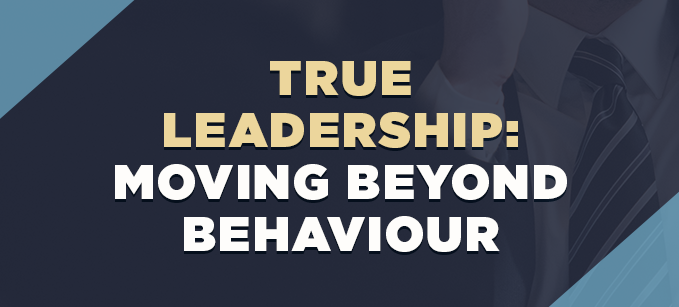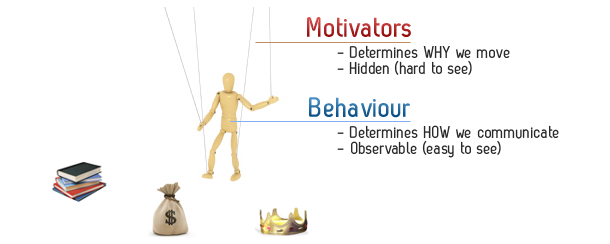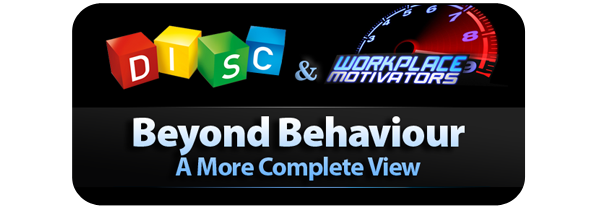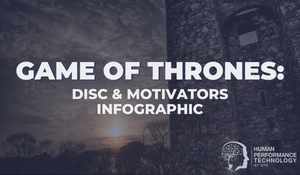True Leadership: Moving Beyond Behaviour

In our work with leaders and teams over the past 20 years, we have been exposed to hundreds of personal development tools, programs, and frameworks designed to improve individual decision-making and team performance.
By far, the most popular and well-received tool that we have ever seen in the workplace is the DISC profile. This is largely due to the fact that it is simple, intuitive, easy to remember, and provides powerful insights into human behaviour.
However, one of the most crucial things that leaders want to know in DISC training is: 'What is the best way to motivate someone?' Our answer is that DISC doesn't deal directly with motivation. While you can learn HOW to communicate more effectively with someone, and in doing so improve the relationships between managers and teams, that's not really motivation. Motivation comes from being passionate, excited and energised about the work at hand.
To understand motivation, and therefore the very heart of employee engagement, it's necessary to look beyond HOW people behave (DISC) and look closer at WHY people will move into action (Motivators).
The Role of The Motivational Leader
Being an effective leader is not about inspirational speeches or trying to motivate people in the way a football coach might with a ‘YOU'VE GOT TO DIG DEEPER!’ verbal assault in the face at half time.
While the ability to inspire people is important, effective leaders recognise that energising people is not so much about 'projecting' your own energy onto others in order to accomplish an objective, as much as it about uncovering others’ internal motivations and linking those to the objective at hand.
This is the idea of leadership through inside-out motivation, rather than outward-in motivation.

Example: If the coach tells his player during half time to ‘visualise the trophy, the prize money on offer, the glory of victory, the nation’s pride, and millions of fans watching’, he would never realise that the thought of all those expectations has just made his star player very nervous, for his real motivation comes from his family back home and the calming image he keeps in his mind’s eye of his mum and dad watching him play, which has now been obliterated.
Motivation is much less about external pushing or prodding by management, and much more about what’s inside of the person and what they care about at an emotional level.
External vs. Internal Motivation
Management thinking has been experiencing a sort of ‘renaissance’ — new birth — in recent years on the best way to motivate people. Some of the first thought leaders emerged nearly 50 years ago with the likes of Abraham Maslow, Frederick Hertzberg, Peter Drucker, and now their ideas have re-surfaced again through the books of Stephen Covey, Clayton Christenson, Daniel Pink and many others, which have all stated in various ways that creating an atmosphere where people feel personally motivated is far better than trying to directly motivate them yourself through offering external 'carrot-and-stick' incentives. (E.g. more money if you do this; a bad performance review if you don't do that).
True motivation — that is, powerfully energising and lasting motivation — comes from inside. It comes from wanting to do something because it is personally meaningful and important.
Leaders must therefore understand what people care about most; they must understand their intrinsic motivators.

The Six Major Motivators
Passion is the term we use to describe what moves and motivates a person to take action. Research has discovered that there a six major passions (or motivators) that are present in all of us to different extents:
- Passion for Knowledge (Theoretical)
- Passion for Practicality (Utilitarian)
- Passion for Creativity (Aesthetic)
- Passion for People (Social)
- Passion for Leading (Individualistic)
- Passion for Tradition (Traditional)
The real power lies in being able to identify each person's top one or two passions. This will enable us to understand WHY a person will move toward one thing (a project, work assignment, group or team, etc.) and away from another.
Read more about the 6 major passions — see the Introduction to the Workplace Motivators Profile. (While the Motivators profile still exists, we now offer an updated version called Driving Forces. The original Motivators profile focused on six core human motivators, whereas Driving Forces expands this to twelve factors).
Motivators Drive Behaviour
Our behavioural (DISC) style is observable to everyone around us, but our motivators are not. These function like the clear strings attached to a puppet, which control the direction of where it goes.

Free Talent Insights Profile:
The Talent Insights series is the first assessment in Australia to combine DISC and Motivators feedback. Check out the Talent Insights page and request a sample report here. No hassle, no obligation, no pushy sales person — all done online.


Theo Winter
Client Services Manager, Writer & Researcher. Theo is one of the youngest professionals in the world to earn an accreditation in TTI Success Insight's suite of psychometric assessments. For more than a decade, he worked with hundreds of HR, L&D and OD professionals and consultants to improve engagement, performance and emotional intelligence of leaders and their teams. He authored the book "40 Must-Know Business Models for People Leaders."

/Aligning%20Individual%20Goals%20with%20Organisational%20Objectives.png?width=374&name=Aligning%20Individual%20Goals%20with%20Organisational%20Objectives.png)

We Would Like to Hear From You (0 Comments)